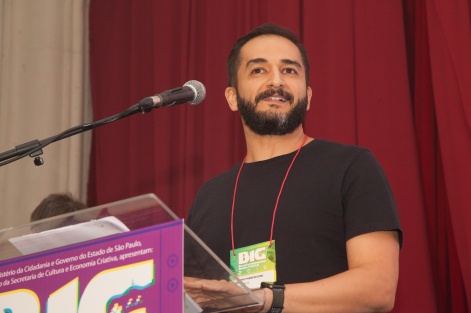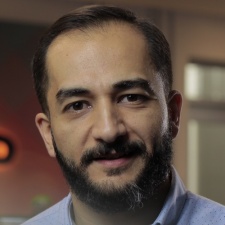The games industry plays host to a colourful cast of diverse individuals, from artists and coders to narrative designers and studio heads.
The skills to pull off these roles, however, are complex and differing, with each position requiring mastery in its field – especially in these complex times we are all living through at the minute.
To highlight some of the brilliant work that goes on behind the scenes as well as how employees around the world are adapting to the life of remote work, PocketGamer.biz is reaching out to the individuals who make up the games industry in our Jobs in Games: Remote Working series.
This week we spoke with Aquiris Game Studios business director Sandro Manfredini.
PocketGamer.biz: Can you tell us about your current role and what it entails?
Sandro Manfredini: I'm the business director at Aquiris Game Studio. My role is primarily to generate revenue growth for the studio year-over-year and there are a lot of activities involved to reach that goal, be that relationships with the platforms/stores, game/updates pitches, and business relationships are some of those activities. Last but not least, internal product/marketing discussion and company management are all encompassed in my day-to-day role.
It's important the person possesses easy communication skills, has a natural talent for networking, organised and have some data analysis expertise.Sandro Manfredini
How did you first get into games and how did you progress into this role?
My background was originally doing business in advertising agencies and I worked with one of Aquiris' angel investors. The mutual connection was key for how I received an invitation to join the team.
A background in marketing and communication has a lot of value in the games industry but it's also important to know how to do business on a global scale. It's a constant learning process, understanding how cultural differences can affect negotiations.
What did you study (if anything) to get your role? What courses would you advise for aspiring professionals in the area?
I haven't finished any of the graduations I started: Mechanical Engineering and Business Administration. So, I'm the perfect example of someone who learned from watching other professionals in the industry.
In terms of studies, the technical courses of English and Negotiation were quite important to me, but I would recommend the Business Administration graduation because it gives a glimpse of a lot of important disciplines.
Do you think there are any misconceptions, public or professional, surrounding your area of expertise?
A misconception can be that people in business are constantly travelling, attending events, dinners, bars, etcetera. When building relationships, it can be seen as just fun but that is definitely not the case, often having to leave your personal routine and family behind to succeed.

In reality, a week of business events can drain all of your energy while also demanding a lot of commitment to attend all appointments. Also, you never know whether someone you are meeting today could turn out to be someone hugely important in future, therefore you need to nurture all relationships the same.
What advice do you have for someone looking for a job in this profession?
It's important the person possesses easy communication skills, has a natural talent for networking, organised and have some data analysis expertise. I understand there are lots of opportunities for business people in the game industry as there are many small studios still composed only by tech experts.
How has the shift from office to remote working impacted your role, if at all?
There's still a lot of concern about finding the right online tools for the creative process.Sandro Manfredini
My role was profoundly impacted considering the business in games was completely dependent on industry events. The industry has been adapting itself fast but building relationships on a personal level are quite important, and you simply can't do that only with video calls.
In addition, mergers and acquisition conversations are still the hardest when you don't have the chance to meet the people in person, or have the chance to see the business you're interested in running.
On the other hand, at least for initial conversations, people are much more open to calls. This can be extremely useful for introductions and can help to accelerate the business where possible.
What does your typical day look like when working remotely?
It's filled with lots of touchpoints and calls with the team to make sure we're all on the same page and working towards the same priorities.
What do you think are the biggest advantages and disadvantages of remote working?
The advantages are related to logistics in my opinion. The fact that you don't have to commute to the office, always have your preferred choice of coffee at your disposal, take lunch whenever you want or eat snacks etcetera. goes a long way. On the other hand, I miss my colleagues and generally just having lunch with the team altogether.
Is there anything you wish you had known before moving to remote working?
There's still a lot of concern about finding the right online tools for the creative process. We have to get as close as possible to being in-person during the design phase, or could face product cohesion problems.
Do you have any advice for others who are struggling to adjust to remote work?
I've seen two main reasons for people struggling:
- A combination of migrating to remote work and starting quarantine at the same time has contributed to a lot of anxiety and stress issues. We're offering psychology sessions to help with this at Aquiris.
- The second is not having a proper workspace setup at home. This is also not an easy one to solve but it's important to find a way to separate work from home so that you always don't feel like you never leave the office.
After the pandemic ends and if you were given the choice, would you prefer to continue working remotely or go back to working in an office?
I will go back to the hybrid model, where I work from home for two to three weeks and then go to the Aquiris offices to spend a week or so, before going back home. Note: I live in São Paulo and Aquiris is based in Porto Alegre, which is a 90-minute flight away.






















